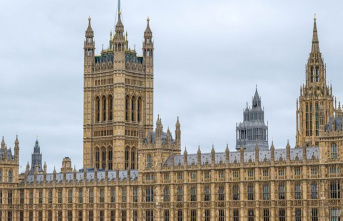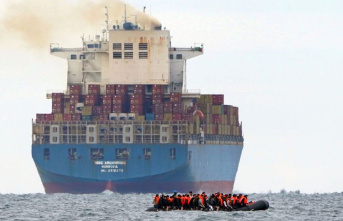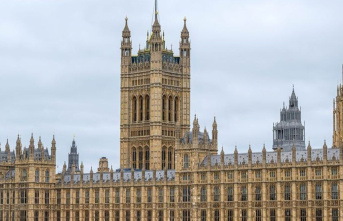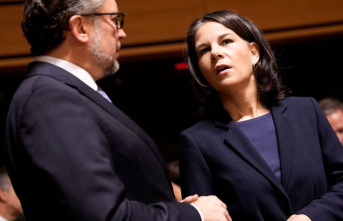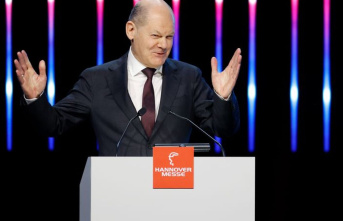This article first appeared on ntv.de.
ntv.de: You recently wrote on Twitter that a clear endorsement of military support for Ukraine often goes hand in hand with contempt for negotiations. Who or what did you have in mind? Nicole Deitelhoff: I was particularly interested in reactions to an essay that Jürgen Habermas had published in the Süddeutsche Zeitung. I felt that the debate had narrowed, where suddenly anyone who advocated peace negotiations was accused of having no idea about Ukraine or being willing to sacrifice Ukraine. Habermas received a lot of opposition, especially on Twitter, and his text was labeled "snot," "snot," senile gossip. This is not a sign of the quality of a healthy debate.
Are the demands for negotiations and the demand for arms deliveries mutually exclusive? No, of course not. The arms shipments are an instrument of diplomacy. They are intended to enable Ukraine to push back Russia and thereby help open a negotiation window.
And how can we tell, for example, whether Ukraine is ready to negotiate territory cessions? There is currently no indication of this in the statements of Ukrainian politicians. Before the start of the negotiations, the negotiating parties make no concessions, but instead put their maximum positions in the foreground. This is the case in all negotiations between warring parties. You don't want to weaken your own negotiating position. Scopes are only explored behind closed doors. We will probably not publicly recognize that there is a willingness to do so - at most through subtle signs.
What might they look like? You might see an unexpected gesture. For example, one side could miss an opportunity for a military advance. Or perhaps an offer will be made in another field of action. That could be about the subject of prisoner exchanges. It's been running quietly for months. But we will most likely not be aware of the start of the negotiations, which are also being negotiated behind closed doors. That's why there are all the talks between the supporters of Ukraine and Russia. That is the reason why Scholz and Macron are still talking to Putin: because they want to recognize the moment when there might be a softening of positions.
At the rally by Alice Schwarzer and Sahra Wagenknecht, the accusation was raised that diplomacy is not taking place. Talks are taking place all the time, that's obvious. There's the prisoner exchange, there's the grain deal. Even fighters from the Azov steelworks returned to Ukraine via the prisoner exchange. The grain agreement is about to expire, so negotiations are now underway as to whether and under what conditions it will be extended. All of this is an expression of diplomacy. But military support or sanctions are also an expression of diplomacy!
Kremlin spokesman Peskov said in November that Russia would achieve its goals "either through the special military operation or through talks." You have already said that it is normal for warring parties to emphasize their maximum positions, but in this war Russia is not just a warring party, it is the aggressor. Russia is indeed a special case in this war. Although both sides are currently showing no interest in negotiations, Ukraine is dealing with something different than Russia. If Ukraine were given the impression that there was a fundamental willingness on the part of the Russian side to at least withdraw behind the February 23, 2022 borders, I believe they would be immediately ready to negotiate. On the Russian side it is different. Here we actually only ever see a repetition or even a radicalization of the war aims.
How would we know if the Russians were willing to negotiate? Willingness to negotiate would be evident if war narratives changed. For example, Russia could signal its willingness to negotiate if it stopped talking about the four annexed Ukrainian oblasts being part of the "core territory" of the Russian Federation. That would be a very big step. I think it is more likely that Russia would try to strategize when formulating the war aims.
For example? One possibility would be that Russia no longer talks about the goal of "denazification" and "demilitarization" of Ukraine, but rather that Ukraine should not pose a security threat to Russia. Then you could negotiate how that could happen.
Up to now, Russia has outlined its war aims using fuzzy propaganda terms such as "denazification" and "demilitarization". So we don't know exactly what Russia wants. Do you have any thesis as to what Russia's current war goals are? I'm as much in the dark as everyone else. But I suppose the minimum Russian target should be the Donbass, the land access to Crimea and Crimea itself, of course. At the same time, I don't think they gave up the goal of crushing all of Ukraine. With this goal, Putin has let the hardliners off the chain, he can hardly get out of it - even if he has realized that it will be difficult.
Is this more of an ideologically driven war for Russia or a war driven by geostrategic interests? Geostrategic interests are paired here with an ideological justification. Geostrategically, Putin was concerned with preventing a relatively large neighboring state from possibly joining the western alliance. One can ask whether such a motive is legitimate, but that question does not matter when it comes to preventing or ending a war. This geostrategic question has a strong ideological underpinning. For Putin, it is also about the fact that, from his point of view, Ukraine is not an independent nation, but belongs to Russia and is only prevented from seeing this by puppet governments installed by the West.
Why did the negotiations between Ukraine and Russia fail in spring 2022? Wagenknecht says that Turkey and then-Israeli Prime Minister Bennett tried to mediate, and that these negotiations "did not fail because of the Russian side," but because of the United States and Great Britain. Historians will be able to tell us more about this in 50 years' time. The US and UK were certainly skeptical about believing Russia's assurances in the spring. I find it implausible that they would have blocked these talks. There was that famous five-hour interview with Naftali Bennett. It was in Hebrew and apparently there were several translation problems. He himself later explained that he did not want to say that the US and Great Britain had actually blocked the talks.
Why did the talks then fail? From my point of view, the final failure was caused by the fact that Russia announced that it would withdraw Russian troops from the Kiev area as a confidence-building measure - and immediately afterwards started the big Donbass offensive with these troops. Linked to the withdrawal from Kiev was the disclosure of the massacres in Bucha and other places. That was the end of the talks. So the failure is not to be blamed on Ukraine, Britain or the US, but on the Russian leadership and Russian troops who committed these crimes.
How do you assess the chances of negotiations at the moment? I would never say that there are no chances for negotiations at all. But the probability is low. The Russian side has made it very clear that they still believe that they can achieve their goals militarily, and they are trying to do so with force. That is why Russia recently rejected China's already weak "peace plan". In Bachmut they fought for a few meters of land, accepting great losses. The Russian leadership obviously doesn't care if their side suffers losses of 50 to 70 percent per combat unit. Meanwhile, Ukraine is hoping for arms deliveries from the West soon so that they can then win back land in a spring offensive and put pressure on Russia. At the same time, the Ukrainian government passed a decree prohibiting it from negotiating directly with Putin. That doesn't make it any easier either. Both sides believe they can turn the balance of power in their favor. Both sides have tied their hands domestically - Putin by the hardliners he himself incited. That makes negotiations not very likely.
If we completely ignore Ukraine's interests, even its interest in surviving as a state and as a people, which course of action is riskier for the West - to supply arms to Ukraine or not to supply arms to Ukraine? It would be riskier not to supply arms to Ukraine to deliver. Then what would happen? Such forecasts are difficult, but Ukraine could probably hold out for a month or two before being militarily defeated. At this moment there would be no incentive for the Russian Federation to compromise on its war aims - quite the contrary. It could roll over Ukraine, it could carry out purges like we have already seen in the occupied territories, it could install a puppet regime in Kiev. A few months later, this puppet regime would probably apply to join the Russian Federation. Russia would move much closer to NATO. And we would be dealing with a Russia that had learned that war is worth fighting to advance its interests.
At a high price. Russia would have to recover from this war, yes, but from a Russian perspective the lesson would be: it can be expensive, it can be bloody, but in the end we win. It could then focus on the next destinations - Georgia, for example, and Moldova. NATO's north-eastern flank, the Baltic states, would also be endangered in a completely different way than today. Of course, the latter would still be unlikely because of the nuclear risk. But a situation in which actors use military force to the point of nuclear escalation to assert their interests has an even higher price for Europe's security.
And the risk associated with the arms shipments? Here is the risk that Russia will use the arms shipments as an opportunity for a nuclear escalation. The West wants to keep this risk as small as possible - in Ukraine, but above all beyond. At all costs, NATO wants to avoid being drawn into a direct conflict with Russia. That's why arms shipments are so hesitant.
Western politicians like US President Biden or Chancellor Scholz are often expected to clearly define their goals in this war. Would that make sense? Yes. Basically, one should not let an opponent know where the limits of engagement lie. It would be fundamentally wrong to send a signal to Russia: If you make very nasty nuclear threats to us, then we won't do anything anymore. That would give Putin a free hand. Because what we are discussing in Germany, in France, in the USA, in Great Britain is also noticed in Russia. This is a very integral part of warfare - psychological warfare. Full transparency would therefore not make sense. But at the same time, the framework in which politicians make their decisions must be explained.
Should Biden and Scholz openly say what they think of retaking Crimea? This is where the strategic nitty-gritty comes in: Under no circumstances should they do so. Thank God I'm not a politician. But as a scientist, I can say that it is best to leave Russia in the dark about how far you are willing to go. Crimea's status can only be part of negotiations if it has not been given up in advance. I don't want to make any recommendations here, neither for the negotiations nor for military strategies, that's not my job. I speak as a negotiation theorist, and as such I say: negotiations and war are closely related. The position you have won is decisive for how much bargaining chip you bring to the talks.
Hitler analogies are always wrong...Yes.
But perhaps a comparison with World War II will help: have conflict researchers ever considered the question of whether the Allies could have negotiated with Hitler? This is more a topic for historians. But the general rule is: You can rarely negotiate with an aggressor before you have created a military situation in which you are forcing him to do so. I was recently asked whether we could not persuade Russia to negotiate with the offer of increased development cooperation. It will not work. Drilling wells will not stop military aggression. A military aggressor can only be stopped militarily. Although that doesn't mean that the goal is unconditional surrender - especially not in the case of a nuclear state. The goal is to get the aggressor to consider retreating and thereby interested in negotiating. When this point comes is not only difficult to see from the outside, but just as difficult to predict.


